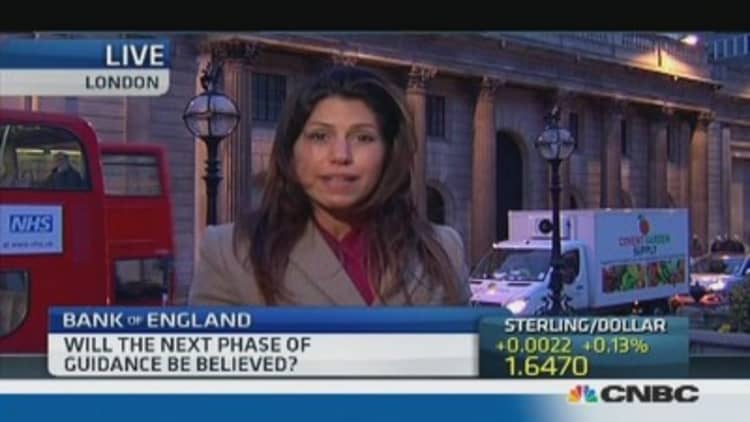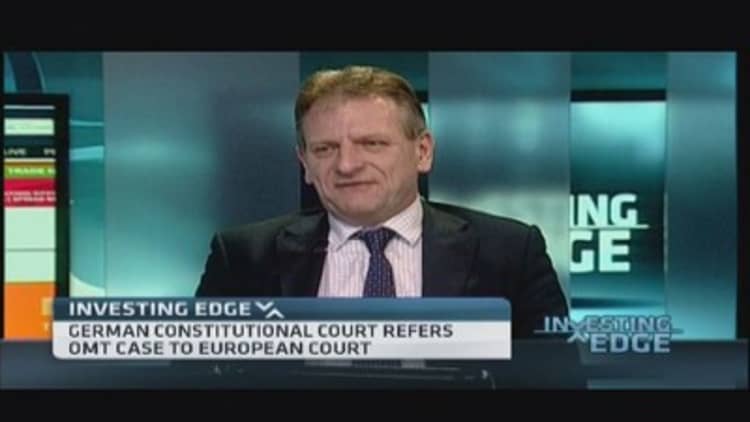
Following the Bank of England's decision to stick to its all-time low interest rate for the 59th month in a row, all eyes are now on the Bank of England's Quarterly Inflation Report on Wednesday – which looks set to be much more eventful.
Governor Mark Carney is expected to unveil adjustments to his controversial "forward guidance" policy, which tied the bank rate to the country's unemployment rates, after a sharp fall in jobless numbers took the U.K.'s central bank somewhat by surprise – and led some to question its integrity.
"Mark Carney has some explaining to do this week when he presents the latest Quarterly Inflation Report," Alastair Winter, chief economist at Daniel Stewart & Co investment bank, wrote in a note.
"He has promised to offer new forward guidance but I cannot help feeling that he need not bother. Whatever he says will not be good enough for some traders and also his critics in the press."
(Read more: Forex manipulation: No evidence BoE staff knew)
In August, Carney announced that the Bank of England would not raise interest rates until the rate of unemployment in the U.K. hit 7 percent. In July, it stood at 7.8 percent and the bank predicted it would not hit this threshold for another three years.
But since the unveiling of forward guidance - which marked a significant departure by Carney from the reign of his predecessor, Mervyn King – joblessness has fallen much faster than expected.

In the three months to November, the rate of unemployment rate slid to 7.1 percent -- its lowest level since 2009 and only slightly higher than the Bank of England's threshold.
And although Carney has repeatedly stressed – and with more insistence over recent months – that unemployment falling to 7 percent would not trigger an automatic interest rate rise, the pressure is on for him to temper expectations of an imminent hike.
Central banks keep interest rates low to stimulate an struggling economy by keeping the cost of borrowing down. A rate hike – usually introduced to combat rising inflation - would hit borrowers hard, and some analysts are concerned that Britain's economic recovery is not strong enough to withstand this potential squeeze on both consumer and business spending.
"The fact that unemployment has come down so rapidly means that it needs to adjust its forward guidance policy to dilute increased expectations that interest rates could rise before long," Howard Archer, chief U.K. and European economist at IHS Global Insight, said in a note.
Options open
But although everyone is expecting a shift in forward guidance, what form it will take is more a matter of debate.
(Read more: Exports and investment to boost UK recovery)
Kathleen Brooks, research director at Forex.com, outlined three options open to the Bank of England.
Firstly, it could move from just one threshold – unemployment – to a broader threshold including, for example, youth unemployment and wage growth; secondly, it could lower the threshold, such as to 6.5 percent; or thirdly, it could publish when each individual member of the Monetary Policy Committee expects rates to rise.
"We believe that the first and second options are more likely to happen, the second option would be the easiest to implement, but the first could help the Bank of England to dispel the notion that the Bank will raise rates once the unemployment rate hits 7 percent," she said in a note.
"The last option would be a fairly radical step for the BOE and there could be some reluctance to this."
Brian Hilliard, U.K. economist at Societe Generale, said Carney's "attempt to repair the tattered reputation of the framework" would probably take the first form.
"The most likely change is to switch to monitoring a wide range of labor market indicators variables and maybe others besides," he wrote in a note.
"The growth and inflation forecasts are likely to be little changed. The key message will be that rates will remain unchanged for some considerable time."
Forecast shifts?
But although the focus of Wednesday's Quarterly Inflation Report will be on forward guidance, the Bank of England will also reveal any updates on its growth forecasts for the U.K.
(Read more: UK economy records fastest growth in 6 years)
Economists do not expect any major changes in its expectations for either gross domestic product (GDP) or inflation from its last inflation report.
In November, it said it expected the U.K. economy to expand by 2.9 percent this year and 2.5 percent in 2015. While inflation is expected to remain close to 2.2 percent in the near term, before falling back to 2.1 percent at the end of this year and to 1.9 percent at the end of next year.
Inflation hit the 2 percent target set by the Bank of England in December for the first time since November 2009.
But Archer stressed that "significantly," the bank's unemployment forecasts would have to be revised down markedly given the recent falls.
—By CNBC's Katrina Bishop.Follow her on Twitter @KatrinaBishop and Google


